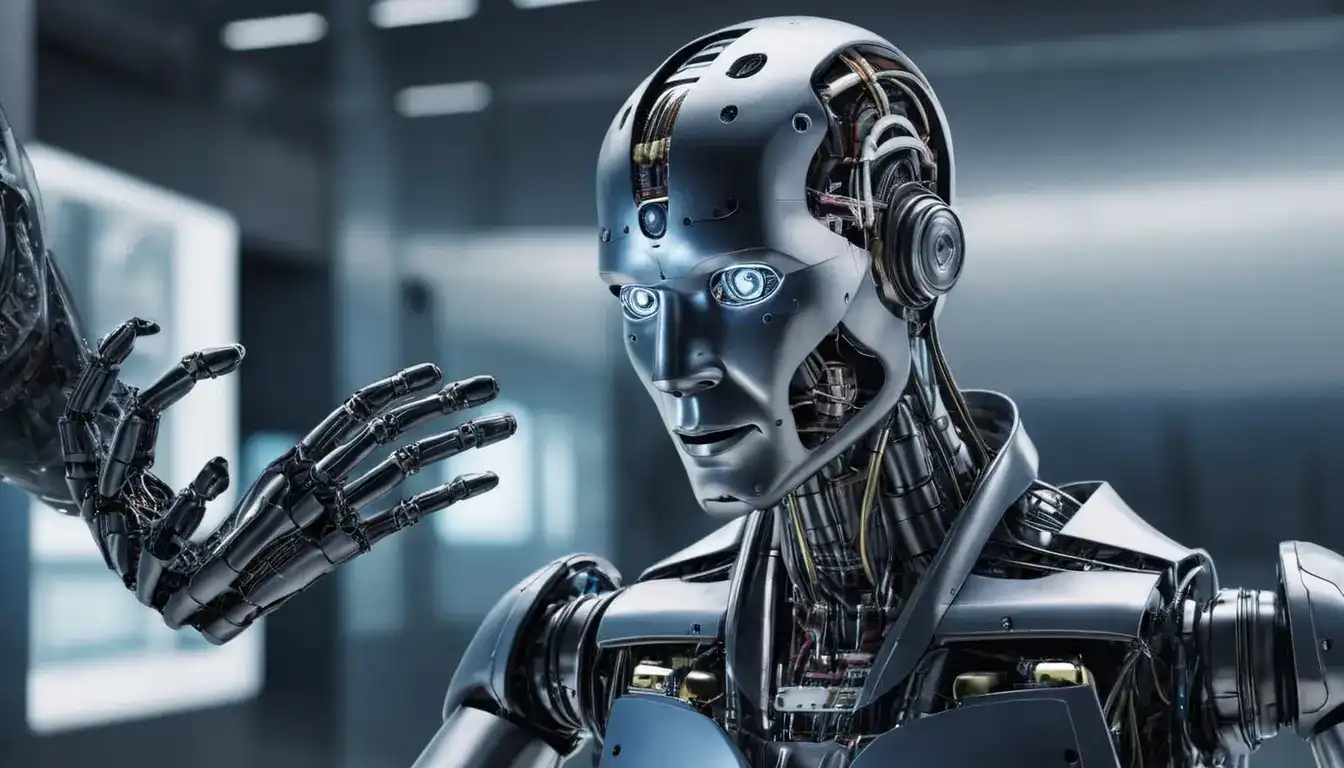How AI is Used to Solve Problems in Various Industries
Emily Willis

Photo: How AI is Used to Solve Problems in Various Industries
Artificial Intelligence (AI) is no longer a futuristic concept. It's a powerful tool that's reshaping industries across the globe. From healthcare to finance, AI is solving complex problems, increasing efficiency, and driving innovation. Let's explore how AI is making a difference in various sectors.
Healthcare: Saving Lives and Improving Care
The healthcare industry is experiencing a transformative shift thanks to AI.
- Drug Discovery: Developing new drugs is a time-consuming and expensive process. AI is accelerating this by analyzing vast amounts of data to identify potential drug candidates. Machine learning algorithms can predict drug interactions and side effects, speeding up clinical trials.
- Disease Diagnosis: AI-powered systems are enhancing diagnostic accuracy. For instance, AI can analyze medical images like X-rays and MRIs to detect abnormalities earlier than human doctors. This early detection can significantly improve patient outcomes.
- Personalized Medicine: AI enables tailored treatment plans based on individual patient data. By analyzing genetic information, medical history, and lifestyle factors, AI can recommend the most effective treatment options.
- Virtual Health Assistants: AI-powered chatbots and virtual assistants provide healthcare information, schedule appointments, and even offer basic medical advice. This improves patient access to care, especially in remote areas.
Finance: Smarter Decisions, Less Risk
The financial sector is leveraging AI to optimize operations and manage risks.
- Fraud Detection: AI can identify fraudulent activities by analyzing patterns in financial transactions. Machine learning algorithms can detect anomalies in real-time, preventing financial losses.
- Algorithmic Trading: AI-driven trading systems make high-speed trading decisions based on complex data analysis. These systems can identify market trends and execute trades faster than humans.
- Credit Scoring: AI can assess creditworthiness more accurately by considering a wider range of data points beyond traditional credit scores. This helps financial institutions make lending decisions with greater confidence.
- Customer Service: AI-powered chatbots provide instant customer support, answering frequently asked questions and resolving issues efficiently. This improves customer satisfaction and reduces the workload on human agents.
Retail: Enhancing Customer Experience and Supply Chain
AI is transforming the retail industry by improving customer experiences and optimizing operations.
- Personalized Recommendations: AI analyzes customer behavior and preferences to suggest products tailored to individual tastes. This increases sales and customer satisfaction.
- Inventory Management: AI-powered systems optimize inventory levels by predicting demand accurately. This prevents stockouts and overstocking, reducing costs.
- Supply Chain Optimization: AI can optimize transportation routes, predict supply chain disruptions, and improve logistics efficiency. This leads to faster delivery times and lower costs.
- Virtual Try-Ons: AI-powered virtual try-on tools allow customers to visualize how clothes or accessories look on them without physically trying them on. This enhances the shopping experience.
Manufacturing: Increased Efficiency and Quality
AI is driving improvements in manufacturing processes, leading to higher productivity and product quality.
- Predictive Maintenance: AI can predict equipment failures by analyzing sensor data, allowing for preventive maintenance and avoiding costly breakdowns.
- Quality Control: AI-powered systems can inspect products for defects with greater accuracy and speed than human inspectors. This improves product quality and reduces returns.
- Supply Chain Optimization: Similar to retail, AI optimizes manufacturing supply chains, ensuring timely delivery of materials and components.
- Robotics: AI-powered robots collaborate with human workers on assembly lines, increasing efficiency and precision.
Transportation: Safer Roads and Smarter Logistics
AI is revolutionizing the transportation industry, making it safer and more efficient.
- Autonomous Vehicles: Self-driving cars powered by AI have the potential to reduce accidents and traffic congestion.
- Route Optimization: AI algorithms optimize delivery routes, reducing fuel consumption and delivery times.
- Predictive Maintenance: AI can predict maintenance needs for vehicles, preventing breakdowns and ensuring safety.
- Traffic Management: AI-powered systems can analyze traffic patterns and optimize traffic flow, reducing congestion.
Agriculture: Increasing Yields and Sustainability
AI is helping farmers increase crop yields, conserve resources, and improve sustainability.
- Precision Agriculture: AI analyzes data from sensors and satellites to optimize planting, irrigation, and fertilization. This leads to higher crop yields and reduced water usage.
- Crop Monitoring: AI-powered systems can detect plant diseases and pests early, allowing for timely interventions.
- Livestock Management: AI can monitor animal health, optimize feed, and improve livestock productivity.
These are just a few examples of how AI is being used to solve problems in various industries. As AI technology continues to advance, we can expect even more innovative applications in the future.
Artificial Intelligence (AI) is rapidly evolving, and its impact is only going to grow in the years to come. While AI has already transformed many industries, its future potential is even more astounding. Let's explore some of the exciting possibilities that AI holds for the future.
AI-Powered Healthcare: Personalized Medicine and Extended Lifespans
AI is poised to revolutionize healthcare, making it more personalized, efficient, and accessible.
- Personalized Medicine: AI will enable doctors to tailor treatments to individual patients based on their unique genetic makeup, medical history, and lifestyle. This will lead to more effective treatments and improved patient outcomes.
- Disease Prevention: AI can analyze vast amounts of data to identify patterns and predict health risks. This allows for early intervention and prevention of diseases before they become serious.
- Extended Lifespans: AI could play a role in extending human lifespans by developing new treatments for aging-related diseases and improving overall health.
AI-Driven Education: Personalized Learning and Enhanced Accessibility
AI is transforming education by providing personalized learning experiences and making education more accessible.
- Personalized Learning: AI-powered systems can adapt to each student's learning style and pace, providing individualized instruction and feedback. This will improve student engagement and learning outcomes.
- Adaptive Learning: AI can assess student knowledge and skills in real-time, adjusting the curriculum and difficulty level accordingly. This ensures that students are always learning at the right level.
- Accessibility: AI can provide educational resources and support to students with disabilities, making education more inclusive.
AI-Powered Augmented Reality: Enhancing Reality and Transforming Interactions
AI-powered augmented reality (AR) is set to blend the digital and physical worlds in new and exciting ways.
- Enhanced Experiences: AR can overlay digital information onto the real world, providing users with real-time information and context. This can be used for navigation, education, entertainment, and more.
- Transforming Interactions: AI can make AR interactions more natural and intuitive, allowing users to interact with digital objects and environments in a more seamless way.
- New Applications: AR can be used for a wide range of applications, such as remote maintenance, training, and gaming.
AI-Driven Robotics: Automation and Collaboration with Humans
AI-powered robotics is automating tasks and enabling robots to collaborate with humans in new ways.
- Automation: AI-powered robots can automate repetitive and dangerous tasks, freeing up human workers for more complex and creative endeavors.
- Human-Robot Collaboration: AI is enabling robots to work alongside humans safely and efficiently. This collaboration can lead to increased productivity and innovation.
- New Applications: AI-powered robots can be used for a variety of applications, such as healthcare, manufacturing, and construction.
AI-Powered Sustainability: Addressing Climate Change and Environmental Challenges
AI can play a crucial role in addressing climate change and environmental challenges.
- Energy Efficiency: AI can optimize energy consumption in buildings, homes, and industries, reducing greenhouse gas emissions.
- Renewable Energy: AI can help develop and deploy renewable energy sources more efficiently.
- Environmental Monitoring: AI can monitor environmental conditions, such as deforestation and pollution, and provide insights for sustainable management.
AI and the Future of Work: New Jobs and Skills
AI will transform the workforce, creating new jobs and requiring new skills.
- New Jobs: AI will create new jobs in areas such as AI development, data analysis, and human-robot collaboration.
- Reskilling and Upskilling: Workers will need to reskill and upskill to adapt to the changing job market. This will require investment in education and training.
- Universal Basic Income: AI-driven automation may lead to job displacement. Universal basic income (UBI) could provide a safety net for those affected.
AI and Ethics: Ensuring Responsible Development and Use
As AI becomes more powerful, it's crucial to address ethical concerns.
- Transparency and Explainability: AI systems should be transparent and explainable, allowing humans to understand how they make decisions.
- Bias and Fairness: AI systems should be developed and used in a way that avoids bias and discrimination.
- Safety and Security: AI systems should be safe and secure to prevent harm.
Conclusion
AI is a powerful tool with the potential to transform our world in countless ways. By harnessing AI responsibly, we can create a better future for all. However, it's essential to address ethical concerns and ensure that AI is developed and used in a way that benefits humanity.
AI is not without its risks, but the potential benefits are immense. As we continue to develop and refine AI technologies, we must carefully consider the ethical implications and strive to use AI for the betterment of society.
Latest ✨
View Allvibrant cultures of Mexico, China, and India, highlighting their unique customs, traditions, and ways of life. It emphasizes the importance of immersing oneself in these cultures to connect with the soul of a place and create lasting memories.
Emily Willis
Virtual reality (VR) and augmented reality (AR) are transforming the entertainment industry by offering immersive experiences that blur the lines between the real and virtual worlds. VR completely transports users into computer-generated environments, while AR overlays digital elements onto the real world.
Emily Willis
The Pacific Ocean is home to remote and enchanting islands that offer untouched natural beauty, rich cultures, and unique experiences for adventurous travelers. Tips for exploring these hidden gems include researching your destination, packing light, respecting local culture, exploring responsibly, and staying safe.
Emily Willis
concept of "sports for social good," which uses the power of sports to address social issues and create positive change. It highlights the impact of sports on diversity, gender equality, youth development, community engagement, health, and peacebuilding.
Emily Willis
Business
View All
August 5, 2024
How to Create Engaging Content and Convert Visitors to Customerscreating engaging content to attract and retain customers in the digital age. It provides strategies for understanding the audience, setting content goals, creating high-quality content, using storytelling and emotional connection, and optimizing content for conversions. It also covers content formats and distribution, measuring and analyzing content performance, and building relationships with influencers and user-generated content.
Emily Willis

August 5, 2024
How to Improve Your Leadership Skillsleadership skills in achieving organizational success. It discusses various aspects of leadership, including understanding leadership, identifying leadership styles, developing effective communication skills, building trust and credibility, developing emotional intelligence, delegating tasks effectively, embracing continuous learning, fostering a positive work culture, making tough decisions, developing a growth mindset, and building a strong team.
Emily Willis

August 5, 2024
Master Your Business Financial Plan in 5 Stepssecrets to mastering your business financial plan with five simple steps. Learn how to analyze financial data, set measurable goals, and create a comprehensive strategy for success. Unlock profitability, make confident decisions, and ensure a bright future for your business
Emily Willis
Economy
View AllBest Secured Loans for Debt Consolidation with Low Interest Rates | Compare Top Lenders & Save Money on Monthly Payments
Read MoreThe digital economy is rapidly changing the job market, with trends such as remote work, the gig economy, automation, e-commerce, cybersecurity, digital skills, and changes in traditional industries having significant implications. These trends offer both opportunities and challenges, requiring individuals and organizations to adapt by embracing flexibility, investing in continuous learning, and staying abreast of technological advancements in order to thrive in this evolving landscape.
Read MoreIn today's rapidly changing economic landscape, innovation and resilience are more important than ever. Innovation drives progress and competitiveness by creating new ideas and solutions to meet market needs. Resilience helps businesses withstand shocks and bounce back from setbacks by planning strategically and diversifying resources.
Read MoreEntertainment
View All
August 4, 2024
The Latest Music Trends, Artists Influencing Pop Culture, and How Digital Platforms Facilitate the Distribution of Music GloballyThe music industry is constantly changing due to consumer preferences, technology, and the influence of artists. Digital platforms have revolutionized music creation, distribution, and consumption, leading to genre fusion, the rise of independent artists, and collaborative projects. Influential artists like Billie Eilish, BTS, and Taylor Swift have shaped pop culture globally. Streaming services, social media, and direct-to-fan engagement have transformed music distribution. Digital platforms also promote cultural diversity and inclusivity, expand markets and revenue, and drive technological advancements. The industry is also focusing on sustainability and ethical practices. To succeed in the future, stakeholders must embrace digital transformation and champion inclusivity.
Emily Willis

August 5, 2024
Video Games: Enduring Appeal, Immersive Worlds, and Diverse Genresenduring appeal of video games, highlighting their ability to transport players to fantastical realms, challenge their minds, and foster connections with others. It explores the magic of immersive worlds, the vast array of genres available, and the social power of gaming.
Emily Willis

August 5, 2024
Music Universal Language: Connecting and Inspiring Across CulturesMusic has the power to transcend language barriers and connect people on a deep emotional level. It serves as a bridge between cultures, fostering understanding and appreciation for diversity. The universality of rhythm and melody creates a sense of unity, while the diversity of musical styles allows for exploration and creativity.
Emily Willis
Health
View AllRegular exercise is essential for maintaining both physical and mental health. It helps with weight management, cardiovascular health, muscle strength, energy levels, and sleep quality. Exercise also reduces stress and anxiety, improves mood, cognitive function, and self-esteem, and lowers the risk of depression. Different types of exercises, such as aerobic, strength training, flexibility, balance, and mind-body exercises, contribute to overall health. To start and maintain an exercise routine, it is important to start slowly, set realistic goals, find enjoyable activities, stay consistent, and listen to your body.
Emily Willis
Regular physical activity is crucial for maintaining long-term health and well-being. It has numerous benefits, including improving cardiovascular health, aiding in weight management, enhancing mental health, strengthening bones, boosting immune function, and promoting longevity.
Emily Willis
Quality sleep is essential for overall health and well-being, impacting physical, cognitive and emotional functioning. Lack of quality sleep can lead to a variety of health issues, including weakened immune function, heart problems, weight gain and cognitive impairment.
Emily Willis
Trending 🔥
View All
1
3
4
5
6
7
8
9
10
Lifestyle
View AllTechnology
View All
August 5, 2024
Top Unity Software Development Trends to Watch in 2024
Explore the top Unity software development trends that will shape the gaming industry in 2024. From AI integration to VR/AR immersion, cross-platform reach, cloud collaboration, and mobile gaming, Unity is revolutionizing gaming experiences. Stay ahead in the dynamic world of game development with these insights.

August 5, 2024
Top 10 Steam Games of 2024
Discover the 10 best Steam games of 2024 and embark on an unforgettable adventure. From breathtaking open-world epics to thrilling FPS battles, these must-play games will keep you entertained for hours. Get ready to dive into the exciting world of Steam gaming and discover your next favorite game!

August 5, 2024
Application of IoT in Various Industries
The Internet of Things (IoT) has revolutionized various industries by enabling real-time data collection, analysis, and automation. In manufacturing, IoT has led to smart factories, predictive maintenance, and supply chain optimization. In healthcare, IoT has facilitated remote patient monitoring, smart hospitals, and enhanced patient care.

August 5, 2024
Oculus Quest 2 vs HTC Vive Pro – Which Should You Choose?
Oculus Quest 2 vs HTC Vive Pro – which VR headset reigns supreme? Dive into this ultimate showdown to discover the strengths and weaknesses of each, and decide which one is worth your investment. From specs and comfort to content and price, we'll help you make an informed choice.





















